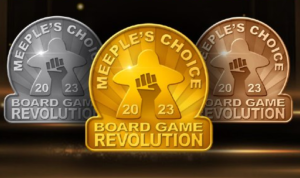
Newly-launched Tabletop Game Designers Association aims to level playing field between designers and publishers
Board game designers in North America can now call upon a professional organisation to help with everything from playtest advice to contract wrangles, thanks to the official launch of the Tabletop Game Designers Association.
The non-profit has been created by Wingspan designer Elizabeth Hargrave, Space Cadets creator Geoff Engelstein and Mind MGMT designer Sen-Foong Lim to advocate for designers in North America, who until now have faced a dearth of industry support compared to their counterparts in Europe.
Tabletop game designers in Germany have been able to lean on support from industry body SAZ since 1991, in the wake of a group of the country’s designers making a pact at the Nuremberg Toy Fair to deny their games to publishers who would not feature their names on box covers.
That stipulation is now taken for granted across tabletop gaming, and over the last 30 years SAZ has also fought for better contract conditions with publishers and the recognition of copyright protection and artistic recognition for board game design work.
In March, for example, SAZ spoke up about game publishers in Germany short-changing designers when it comes to paying out royalties by using opaque payment structures.
TTGDA hopes to follow SAZ’s lead, with a mission to promote the craft of tabletop game design through education and support, advocate for the designers of tabletop games within the industry, and enhance the profile of the profession through proper attribution and recognition of contributions.
SAZ announced its support of its new North American peer, saying it would cooperate closely with TTGDA as it does with French game designer organisation SAJ “in order to expand our representation of interests internationally”.
BoardGameWire spoke to TTGDA co-creator Geoff Engelstein last November when he revealed plans for the TTGDA were in the works.
He said at the time that the need for TTGDA first came to him when he learned about “how Disney was trying to strong arm famed writer Alan Dean Foster over book royalties”.
He said, “Ultimately the Science Fiction and Fantasy Writers went public on his behalf, and together they were able to (somewhat) rectify the situation.
“Even though I have a bit of a ‘name’ in the industry I have had my share of issues with collecting royalties in a timely fashion, and have been presented with contracts with ridiculous clauses.
“Talking with other designers more well-known than I revealed that the scope of the problem was far larger than I realized.
“And if these people were having problems, what was happening to the new designers looking to break into the business?
“Tabletop designers need an organization like the SFWA that can fight on their behalf and expose bad actors.
“There are existing organizations out there including SAZ, SAJ, and AL in Europe. SAZ reaches most beyond their geographic center of Germany (Alan Moon was actually president for a bit).
“We talked with them about expanding into NA, but all agreed that a separate organization would probably be more effective.”
Engelstein added this week, “Even before the launch, we’ve had multiple requests for assistance in navigating sticky situations between designers and publishers. This underscores the vital need for this organization.”
Launch supporters of the association include Pandemic Legacy designers Matt Leacock and Rob Daviau, Magic: The Gathering creator Richard Garfield, Root designer Cole Wehrle and Ticket to Ride creator Alan Moon.
Wehrle said, “The TTGDA helps level the playing field between designers and publishers. Games that are fairly made are better for the designers, the players, and, ultimately, the publishers, too.”
Tom Lehmann, the designer of tabletop games such as Race for the Galaxy and Res Arcana, added, “As tabletop gaming moves from a fringe hobby to the mainstream, TTGDA is poised to become both an invaluable resource for the next generation of game designers and an important voice in our industry.”
BoardGameWire spoke to a pair of long-time board game designers in the wake of the initial TTGDA announcement last November, who described a horror-show of interactions with publishers around contract law, overwork and unprofessional communication and attitudes.






